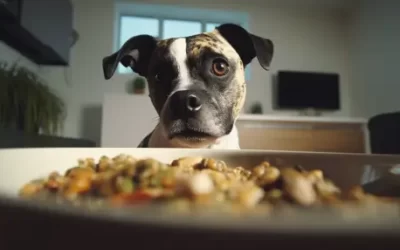Pet owners often find themselves in a quandary when it comes to choosing the right foods for their canine companions.
One common inquiry that echoes through online searches is, “Can dogs eat muscadine grapes?” This question arises from a place of genuine concern and care for our furry friends, reflecting the desire to provide them with a diet that is not only enjoyable but also safe and healthy.
As a seasoned veterinary professional with years of experience in the field, I understand the weight of the decisions we make for our pets. The quest for the right information about what our dogs can and cannot eat is both common and commendable.
Through my extensive knowledge of veterinary medicine and pet nutrition, I’m here to provide the insights you need. The safety of our canine companions is paramount, and I aim to guide you through the intricacies of the “Can dogs eat muscadine grapes?” conundrum.
If you’re seeking a trustworthy source to address your concerns and provide valuable guidance on canine nutrition, you’ve come to the right place.
Dogs should not eat muscadine grapes. While the exact reason behind grape and raisin toxicity in dogs is unknown, these fruits have been linked to kidney failure in canines. Muscadine grapes, like other grape varieties, pose a potential risk, and ingestion can lead to severe health issues.
Understanding Muscadine Grapes

Muscadine grapes, with their unique flavor profile and versatility, have found their way into various culinary endeavors.
As we delve into the world of muscadine grapes, it’s essential to understand not only their appeal to our taste buds but also their impact on our canine companions.
Nutritional Composition
1. Vitamins and Minerals Muscadine grapes boast a nutritional profile that extends beyond their sweet taste. Rich in essential vitamins such as vitamin C, vitamin K, and a spectrum of B-vitamins, these grapes contribute to overall health. Furthermore, they house important minerals like potassium and manganese. However, while humans can benefit from such nutrient richness, the same cannot be said for our furry friends.
2. Antioxidant Content Antioxidants play a pivotal role in neutralizing free radicals and supporting cellular health. Muscadine grapes, recognized for their potent antioxidant properties, offer a natural defense against oxidative stress. These compounds, including resveratrol and quercetin, are celebrated in human nutrition. Still, the canine metabolism differs significantly, prompting a closer look at the potential risks associated with these antioxidants in dogs.
Varieties of Muscadine Grapes
Muscadine grapes come in an array of varieties, each exhibiting its own unique characteristics. From the deep purple hue of the Noble variety to the bronze-tinted Carlos grapes, the diversity is both intriguing and visually appealing.
While humans may explore this diversity in culinary experiences, the canine digestive system calls for a cautious approach.
Understanding the range of muscadine grape varieties becomes crucial when assessing their safety for our four-legged companion
Also Read: Can Dogs Eat Grape Leaves?
The Canine Diet: Unique Considerations

Understanding the nuances of the canine diet is paramount when contemplating the inclusion of unconventional treats like muscadine grapes.
Our canine companions, with their unique physiology, require a diet tailored to their specific needs. Let’s delve into the distinctive considerations that govern what is safe and appropriate for our dogs to consume.
Dietary Differences Between Humans and Dogs
Dogs and humans may share our homes, but their nutritional requirements diverge significantly. While humans can indulge in a variety of fruits, including grapes, the same cannot be said for our furry friends.
Dogs lack certain enzymes, such as one responsible for breaking down the compounds found in grapes. This divergence in digestive processes highlights the need for caution when introducing foods like muscadine grapes into a canine’s diet. What may be a healthy snack for us can pose unforeseen risks for our loyal companions.
Sensitivity of Dogs to Certain Foods
Canines exhibit varying degrees of sensitivity to different foods, and this sensitivity is not uniform across all breeds.
Some dogs may have robust digestive systems, while others may be more prone to allergies or adverse reactions. Muscadine grapes, with their unique composition, could trigger sensitivities in certain dogs.
Recognizing and respecting these individual differences is crucial for responsible pet ownership, guiding us in making informed decisions about what treats are suitable for our furry friends.
Also Read: Can Dogs Eat Grape Popsicles?
The Potential Dangers

While muscadine grapes may entice our taste buds, a shadow of caution looms over their suitability for our canine companions.
Unraveling the potential dangers associated with grapes and raisins is crucial for responsible pet ownership.
Let’s delve into the intricate details of why these seemingly harmless fruits can pose a significant threat to our furry friends.
Grapes and Raisin Toxicity in Dogs
Grapes and raisins, seemingly innocuous in our eyes, have been linked to severe toxicity in dogs. The precise mechanism behind this toxicity remains a subject of ongoing research, but the effects are clear.
Consumption of even small quantities of grapes or raisins can lead to adverse reactions in dogs. From gastrointestinal upset to more severe consequences such as kidney failure, the spectrum of potential dangers warrants a careful examination of the risks associated with muscadine grapes.
Specific Compounds Responsible for Toxicity
The toxicity of grapes and raisins in dogs has been attributed to specific compounds present in these fruits.
Although the exact culprits are not definitively identified, substances like resveratrol and certain flavonoids are under scrutiny. These compounds, celebrated for their health benefits in humans, seem to trigger adverse reactions in canine physiology.
Understanding the biochemical intricacies of these compounds provides a glimpse into why muscadine grapes, despite their nutritional value, can pose a potential threat to our canine companions.
Cases and Veterinary Warnings
History is marked with cases of dogs experiencing toxicity after ingesting grapes or raisins. Veterinary professionals have been at the forefront of raising awareness about this hazard, urging pet owners to exercise utmost caution.
The recorded cases serve as poignant reminders of the real and immediate dangers associated with grape ingestion in dogs.
As we explore the safety of muscadine grapes for our furry friends, these historical instances underscore the importance of heeding veterinary warnings and making informed decisions about our dogs’ dietary choices.
Also Read: Can Dogs Eat Grape Stems?
Can Dogs Eat Muscadine Grapes?

The central question echoing in the minds of concerned pet owners is whether our canine companions can safely indulge in the sweetness of muscadine grapes.
As we navigate the realm of canine nutrition, seeking answers from expert opinions and veterinary perspectives becomes paramount. Let’s explore the factors that influence the safety of feeding muscadine grapes to our furry friends.
Factors Influencing Safety
1. Size and Breed Differences Canine physiology varies widely among different breeds and sizes. What may pose minimal risk to a larger breed might have more pronounced effects on a smaller counterpart. Size and breed differences play a crucial role in determining how a dog’s body processes and reacts to specific foods. Considering these factors becomes pivotal when evaluating the safety of introducing muscadine grapes into a dog’s diet.
2. Individual Sensitivities Much like humans, dogs exhibit individual sensitivities to certain foods. While one dog may tolerate a small amount of muscadine grapes without issue, another may experience adverse reactions. Recognizing and respecting these individual sensitivities is integral to responsible pet ownership. Monitoring for any signs of distress or discomfort after consumption is essential, emphasizing the importance of tailoring dietary choices to each dog’s unique needs.
Also Read: Can Dogs Eat Yucca Fries?
Signs of Grape Toxicity in Dogs

While the allure of sharing our favorite snacks with our dogs is understandable, the potential dangers of grape toxicity loom large.
Recognizing the signs of grape toxicity in dogs is crucial for prompt intervention and safeguarding their well-being. Let’s delve into the immediate symptoms, long-term effects, and when to seek veterinary attention.
Immediate Symptoms
The onset of grape toxicity can manifest in immediate symptoms, often signaling an urgent need for attention.
Gastrointestinal distress, including vomiting and diarrhea, is among the initial signs. Restlessness, abdominal pain, and lethargy may accompany these digestive disturbances. Immediate symptoms serve as red flags, prompting pet owners to act swiftly.
Recognizing these signs is pivotal, especially if there’s a suspicion of muscadine grape ingestion, allowing for rapid response and minimization of potential harm.
Long-Term Effects
Beyond the immediate distress, grape toxicity can have lasting effects on a dog’s health. The kidneys, in particular, are vulnerable to damage.
Prolonged exposure to the toxic compounds in grapes may lead to kidney failure, a severe and potentially life-threatening condition. Understanding the long-term implications emphasizes the importance of preventing grape ingestion in dogs.
Responsible pet ownership involves not only recognizing immediate symptoms but also being cognizant of the potential for lasting harm.
When to Seek Veterinary Attention
Determining when to seek veterinary attention is a critical aspect of responding to grape toxicity. If a dog exhibits any signs of immediate distress or if there is suspicion of grape ingestion, prompt consultation with a veterinarian is paramount.
Additionally, even in the absence of immediate symptoms, any known or suspected ingestion of muscadine grapes should prompt a vet visit.
Early intervention can make a significant difference in mitigating the effects of grape toxicity and ensuring the best possible outcome for our canine companions.
Also Read: Can Dogs Eat Freeze Dried Mango?
Alternatives and Safe Treats

Navigating the world of canine treats requires a discerning eye and a commitment to our pets’ well-being.
Fortunately, there are a plethora of alternatives and safe treats that can bring joy to our furry friends without the potential risks associated with muscadine grapes.
Let’s explore dog-friendly fruits, homemade treat ideas, and a selection of safe fruits and snacks tailored for canine consumption.
Dog-Friendly Fruits
- Apples: Rich in fiber and vitamins, apples are a crunchy and refreshing treat for dogs. Ensure to remove seeds and core before offering.
- Blueberries: Packed with antioxidants, blueberries are a nutritional powerhouse. They make for a tasty and safe addition to your dog’s snack repertoire.
- Bananas: High in potassium and easily digestible, bananas are a favorite among many dogs. Serve in moderation due to their sugar content.
- Watermelon: A hydrating option for warm days, watermelon is safe for dogs when seeds and rind are removed. It provides a sweet and juicy indulgence.
- Strawberries: Another antioxidant-rich choice, strawberries offer a burst of flavor and nutritional benefits. Cut into smaller pieces for easy consumption.
Homemade Treat Ideas
- Peanut Butter Biscuits: A classic favorite, homemade peanut butter biscuits are not only delicious but also allow you to control the ingredients.
- Sweet Potato Chews: Sliced and baked sweet potatoes serve as a tasty, chewy alternative. Rich in vitamins, they’re a healthy homemade option.
- Carrot Sticks: Crisp and low in calories, carrot sticks make for an excellent chewy treat that promotes dental health.
- Frozen Pumpkin Cubes: Mix pureed pumpkin with water and freeze into cubes for a refreshing and nutritious summer treat.
- Oatmeal and Banana Cookies: Combine oats, mashed banana, and a touch of honey for homemade cookies that are both wholesome and enjoyable for dogs.
Safe Fruits and Snacks for Canine Consumption
When selecting treats for our dogs, it’s essential to prioritize safety and nutritional value. Opting for safe fruits like apples, blueberries, bananas, watermelon, and strawberries provides a diverse range of flavors while avoiding the potential risks associated with grapes.
Additionally, exploring homemade treat ideas allows pet owners to cater to their dogs’ preferences while maintaining control over ingredients. Always consult with a veterinarian to ensure chosen treats align with your dog’s dietary needs and any specific health considerations.
With a thoughtful approach, we can offer our canine companions delightful and safe treats that contribute to their overall well-being.
Also Read: Can Dogs Eat Dried Squid?
Final Thoughts: Can Dogs Eat Muscadine Grapes?

Dogs should not eat muscadine grapes. Muscadine grapes, like other varieties of grapes and raisins, have been associated with toxicity in dogs.
Even though the exact mechanism is not fully understood, ingestion of these fruits can lead to severe adverse effects, including gastrointestinal upset and, in some cases, kidney failure.
It’s crucial for responsible pet owners to avoid giving their dogs muscadine grapes and to opt for safe alternatives, such as dog-friendly fruits like apples, blueberries, and bananas, as well as homemade treats carefully curated with their canine companions’ well-being in mind..
Key Points
In summary, muscadine grapes, despite their tempting sweetness, pose potential risks to our dogs. The toxicity associated with grapes and raisins has been well-documented, urging pet owners to exercise utmost caution.
Our examination of expert opinions, factors influencing safety, and the signs of grape toxicity serves as a comprehensive guide for responsible decision-making in canine nutrition.
It is imperative to acknowledge the dietary differences between humans and dogs, the sensitivity of individual dogs to certain foods, and the importance of recognizing immediate symptoms of toxicity.
Responsible Pet Ownership
The responsibility of pet ownership extends beyond companionship to the choices we make on behalf of our furry family members.
When it comes to treats and dietary decisions, the adage “knowledge is power” rings particularly true. Being aware of the potential dangers associated with certain foods, such as muscadine grapes, empowers us to make choices that prioritize the health and safety of our dogs.
Responsible pet ownership is not merely a duty; it’s a pledge to provide the best possible care and protection.
Further Research and Awareness
As we conclude, let this exploration into the safety of muscadine grapes for dogs be a starting point rather than a definitive answer.
The world of veterinary science and pet nutrition is dynamic, with ongoing research shedding light on new insights.
Encouraging fellow pet owners to stay informed, seek updated guidance from veterinary professionals, and actively participate in raising awareness about canine nutrition fosters a collective commitment to the well-being of our canine companions.
In the ever-evolving landscape of pet care, our dedication to research and awareness ensures that our dogs lead healthy, happy lives filled with safe and delightful treats.









